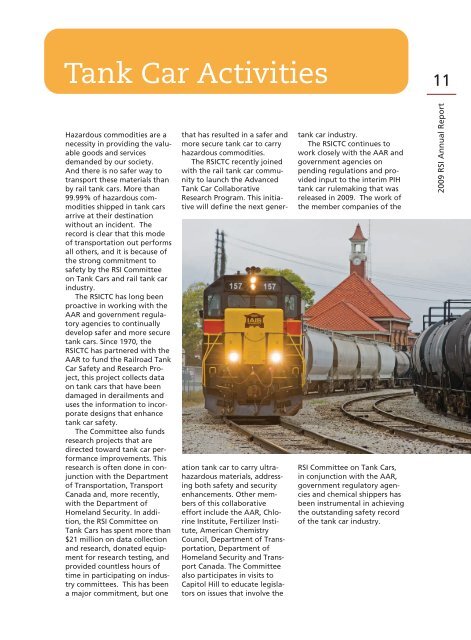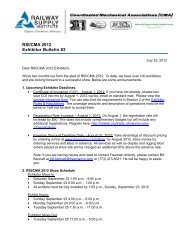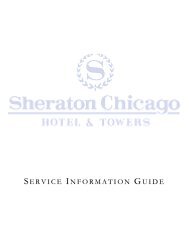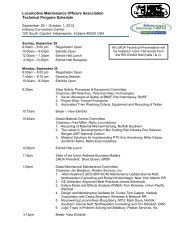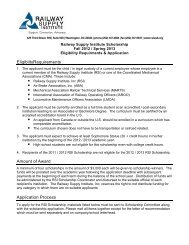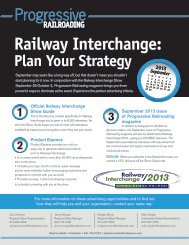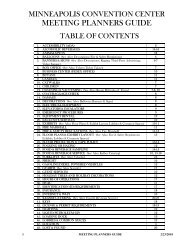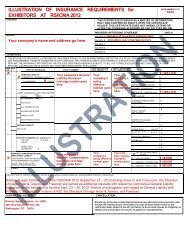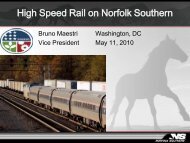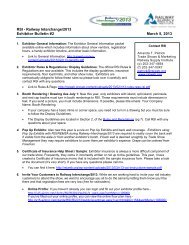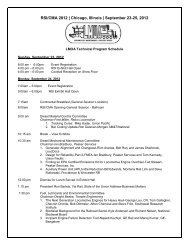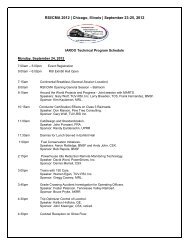RSI Annual Report 2009 - Railway Supply Institute
RSI Annual Report 2009 - Railway Supply Institute
RSI Annual Report 2009 - Railway Supply Institute
Create successful ePaper yourself
Turn your PDF publications into a flip-book with our unique Google optimized e-Paper software.
Tank Car Activities<br />
11<br />
Hazardous commodities are a<br />
necessity in providing the valuable<br />
goods and services<br />
demanded by our society.<br />
And there is no safer way to<br />
transport these materials than<br />
by rail tank cars. More than<br />
99.99% of hazardous commodities<br />
shipped in tank cars<br />
arrive at their destination<br />
without an incident. The<br />
record is clear that this mode<br />
of transportation out performs<br />
all others, and it is because of<br />
the strong commitment to<br />
safety by the <strong>RSI</strong> Committee<br />
on Tank Cars and rail tank car<br />
industry.<br />
The <strong>RSI</strong>CTC has long been<br />
proactive in working with the<br />
AAR and government regulatory<br />
agencies to continually<br />
develop safer and more secure<br />
tank cars. Since 1970, the<br />
<strong>RSI</strong>CTC has partnered with the<br />
AAR to fund the Railroad Tank<br />
Car Safety and Research Project,<br />
this project collects data<br />
on tank cars that have been<br />
damaged in derailments and<br />
uses the information to incorporate<br />
designs that enhance<br />
tank car safety.<br />
The Committee also funds<br />
research projects that are<br />
directed toward tank car performance<br />
improvements. This<br />
research is often done in conjunction<br />
with the Department<br />
of Transportation, Transport<br />
Canada and, more recently,<br />
with the Department of<br />
Homeland Security. In addition,<br />
the <strong>RSI</strong> Committee on<br />
Tank Cars has spent more than<br />
$21 million on data collection<br />
and research, donated equipment<br />
for research testing, and<br />
provided countless hours of<br />
time in participating on industry<br />
committees. This has been<br />
a major commitment, but one<br />
that has resulted in a safer and<br />
more secure tank car to carry<br />
hazardous commodities.<br />
The <strong>RSI</strong>CTC recently joined<br />
with the rail tank car community<br />
to launch the Advanced<br />
Tank Car Collaborative<br />
Research Program. This initiative<br />
will define the next generation<br />
tank car to carry ultrahazardous<br />
materials, addressing<br />
both safety and security<br />
enhancements. Other members<br />
of this collaborative<br />
effort include the AAR, Chlorine<br />
<strong>Institute</strong>, Fertilizer <strong>Institute</strong>,<br />
American Chemistry<br />
Council, Department of Transportation,<br />
Department of<br />
Homeland Security and Transport<br />
Canada. The Committee<br />
also participates in visits to<br />
Capitol Hill to educate legislators<br />
on issues that involve the<br />
tank car industry.<br />
The <strong>RSI</strong>CTC continues to<br />
work closely with the AAR and<br />
government agencies on<br />
pending regulations and provided<br />
input to the interim PIH<br />
tank car rulemaking that was<br />
released in <strong>2009</strong>. The work of<br />
the member companies of the<br />
<strong>RSI</strong> Committee on Tank Cars,<br />
in conjunction with the AAR,<br />
government regulatory agencies<br />
and chemical shippers has<br />
been instrumental in achieving<br />
the outstanding safety record<br />
of the tank car industry.<br />
<strong>2009</strong> <strong>RSI</strong> <strong>Annual</strong> <strong>Report</strong>


